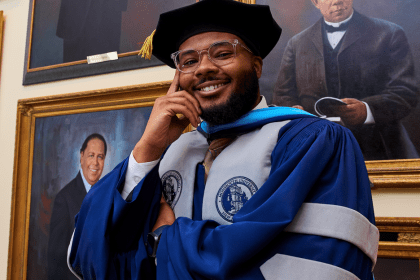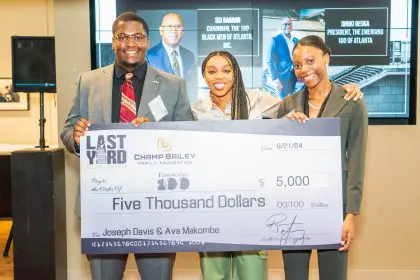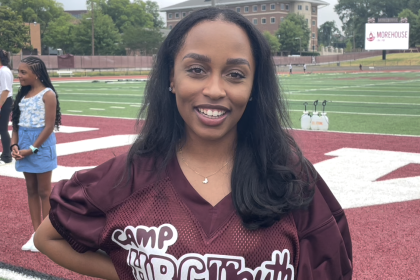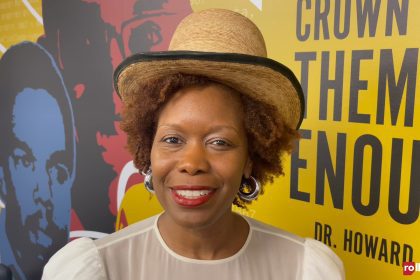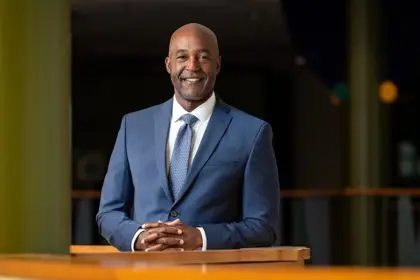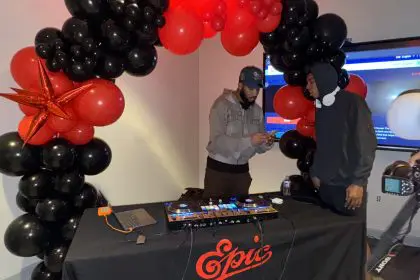By: Warren Chancellor
This fall, as class at Morehouse went back in session, 12 Morehouse alums were facing a very different first day of school — this time as teachers with Teach For America. Their decision to direct their talents to the classroom speaks to the commitment and leadership of Morehouse men — a legacy that has made our school a top contributor to Teach For America for four years running. It’s a decision I remember well — one that led me to a classroom of Atlanta 10th graders and a career that’s been more challenging and inspiring than I ever could have imagined.
In true first-year teacher fashion, on my first day as an educator, I stood before a room full of anxious and excited sophomores at South Atlanta High School and told them my story. I told them about growing up in Charlotte, [North Carolina], about my experiences in the marching band, going on to study mathematics at Morehouse, and all the twists and turns in life that landed me in front of them in Room D104. I did it because I thought I was supposed to. In my mind, my only objective for the year was to be an amazing math teacher. So I told my story, checked it off my first-day-of-school to-do list and geared up to transition into one- and two-step equations. Then, I was interrupted.
“So Mr. Chancellor, how many brothers and sisters do you have?” “What was your neighborhood like?” “What was Morehouse like?” “What made you want to study math?” “Why are you a teacher?” As I tried to answer the rapid-fire questions and appease the curiosity of my students, I wondered what made them so curious about details that I felt to be inconsequential to my role as an educator.
The questions kept coming. I noticed that my male students, in particular, were hanging around my classroom — before school, between classes, even after school. At first it was a couple, eventually the number grew to 10 or more, including some students I didn’t even teach. They would ask me questions about my life and experiences and share their own. We talked about the world, we talked about race, we talked about identity, we talked about things that had happened in the news or in the neighborhood. Students brought issues, questions, concerns, fears, ambitions, hopes, dreams, and even the latest gossip. Some would solicit advice, some just wanted to vent, others had nothing to say and just wanted to be in that space. Those times were some of my favorite and they had nothing to do with what I perceived my job as an educator to be.
One afternoon, a student walked into my room after school as I was preparing for the next day. He entered nonchalantly and plopped down quietly at a desk. A frequent visitor who never really said much, I had grown accustomed to his presence. That day though, I broke the silence. “Keith,” I asked, “Why do you guys always come around here to hang out?” He sat up, seemingly taken aback. After considering my question for a moment, “I dunno” he said (this is the response students give when they need more time to think). “I guess it’s kinda like looking into the future. You know, being able to see what you want yourself to be.”
In that moment, it became clear to me that there is much more to this job than teaching binomials and quadratic equations. Our society provides Keith and students like him a narrow perspective as to what a black man is and can be. There at the front of the classroom, I stood counter to that narrative.
Today, Keith himself gets to stand as a role model and as a man of Morehouse. After working hard for several years at community college, this fall he enrolled at Morehouse as a business administration student. As he begins this next chapter, I feel both immense pride and cautious excitement. But mostly, I feel humbled that as his teacher, I was able to give Keith that look into his future, one that is now brighter than ever.
The kids we work for need to see themselves in positive ways daily. Getting there will require more black men in classrooms. Of course, just being there isn’t enough. We need to come with the critical consciousness, clarity of identity, and commitment to the art and science of teaching required to truly impact our students. My years in the classroom inspired me to spend my career working to expand opportunity for students of color growing up in poverty. I’m proud and privileged to do the work.
At this critical moment for our nation, I am looking for my brothers to stand up. For those of us preparing to leverage our leadership and join this work — whether through Teach For America or countless other programs that prepare teachers to make a great impact — kudos to you. For those still imagining your futures, I hope you’ll spend the coming year considering the legacy you’d like to leave.
Warren Chancellor is a 2010 Morehouse grad and alum of Teach For America. He is currently overseeing event operations for the organization’s 25th Anniversary Summit and previously served as chief of staff to Teach For America’s executive vice president of alumni affairs.
The article was also published in ‘Maroon Tiger,’ Morehouse College’s publication.



